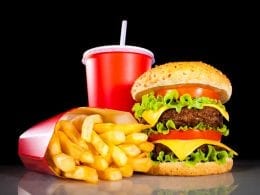 The addiction circuit in the brain is wired to release dopamine, a feel good neurotransmitter that is increased in the limbic system whenever a pleasurable sensation enters the body. Many individuals relate addiction to drugs and alcohol however food addiction is a true addiction that can result in unhealthy behaviors both mentally and physically and can even lead to eating disorders. Burgers, fries, milkshakes, hotdogs are all fast food items that are high in sugar, salt, processed carbohydrates and unhealthy fats which are all ingredients that can trigger the same release of dopamine in the addiction center of the brain. Fast food chains are a multi billion-dollar industry in the United States because they are conveniently located, provide fast service, are relatively inexpensive and serve food that is addicting and results in a surge of dopamine. Overtime individuals begin to crave this type of food and find themselves in front of the drive-thru more often than they would have imagined.
The addiction circuit in the brain is wired to release dopamine, a feel good neurotransmitter that is increased in the limbic system whenever a pleasurable sensation enters the body. Many individuals relate addiction to drugs and alcohol however food addiction is a true addiction that can result in unhealthy behaviors both mentally and physically and can even lead to eating disorders. Burgers, fries, milkshakes, hotdogs are all fast food items that are high in sugar, salt, processed carbohydrates and unhealthy fats which are all ingredients that can trigger the same release of dopamine in the addiction center of the brain. Fast food chains are a multi billion-dollar industry in the United States because they are conveniently located, provide fast service, are relatively inexpensive and serve food that is addicting and results in a surge of dopamine. Overtime individuals begin to crave this type of food and find themselves in front of the drive-thru more often than they would have imagined.
The research behind food addiction
Fast food that is high in fat, sugar and salt has been shown to release the same type of neurotransmitters as cocaine or alcohol resulting in a feel-good sensation creating an urge to eat more. A study showed that compulsive eating in rats had the exact same reaction on the brain as cocaine or other illicit drug use and the researchers demonstrated that the pleasure centers of a rat’s brain were over stimulated when given food high in fat and also when given cocaine. As a result fast food can trigger the addiction circuit in the brain resulting in the body craving more of this food due to brain changes and eventually resulting in compulsive overeating. After a large fast food meal, the increased surge of dopamine is slowly replaced by high levels of insulin bringing the body down to a low while simultaneously craving more of the fast food in order to produce a surge of dopamine.
Fast food can be self-medicating
Many individuals who are struggling with mental illness such as depression or anxiety use food as a way to cope with their emotions and mental illness. Also many individuals who suffer from chronic pain use fast food and other comfort food to elicit positive emotions in order to be able to live with the pain. Although these types of foods may temporarily relieve unsettling emotions and physical pain, using fast food to self-medicate can result in disordered eating and health concerns such as diabetes and weight gain.
Reasons for compulsive overeating
Although mental health professionals do not recognize compulsive overeating as a formal eating disorder, it is a type of disordered eating and it can result in binge eating which is a recognized eating disorder. Additionally, compulsive overeating can worsen depressive symptoms and vice versa. There are multiple reasons to engage in compulsive overeating such as eating out of habit, eating to relieve a negative emotional state and eating secondary to food addiction. Habitual overeating is when an individual eats simply out of habit or boredom and consumption of food is rarely based on hunger or a desire to eat. Habitual eaters are not always depressed however when taking a closer look at depressive symptoms such as isolation and loneliness, loss of interest and apathy, these characteristics can go along with habitual eating.
Treatment for compulsive overeating
Cognitive behavioral therapy is considered the first-line treatment approach in compulsive overeating and in binge-eating disorder. Cognitive behavioral therapy encompasses multiple techniques that focus on identifying and challenging negative automatic thoughts and behaviors and using techniques to reinforce positive behaviors and cognition. Distorted or maladaptive thoughts regarding food and body image are initially identified and addressed in order to allow better insight and understanding of the underlying triggers associated with these thoughts. Both the individual and therapist must recognize these thoughts and when and why they occur in order for behavioral change to take place. Behavioral approaches to recognizing and eliminating maladaptive thoughts associated with body weight include food journaling, exploring the underlying irrational beliefs regarding the individual’s self-esteem, learning to differentiate between certain emotional feelings and maintaining a written log of thoughts and resulting feelings. Cognitive behavioral therapy helps with the binging behavior but is not associated with the weight loss.
Nutrition and dietary therapy are also highly recommended for compulsive overeating as it is important for the individual to gain insight on when, how much and which types of food to eat in order to maintain a healthy weight while simultaneously having a sufficient intake of vitamins and nutrients.